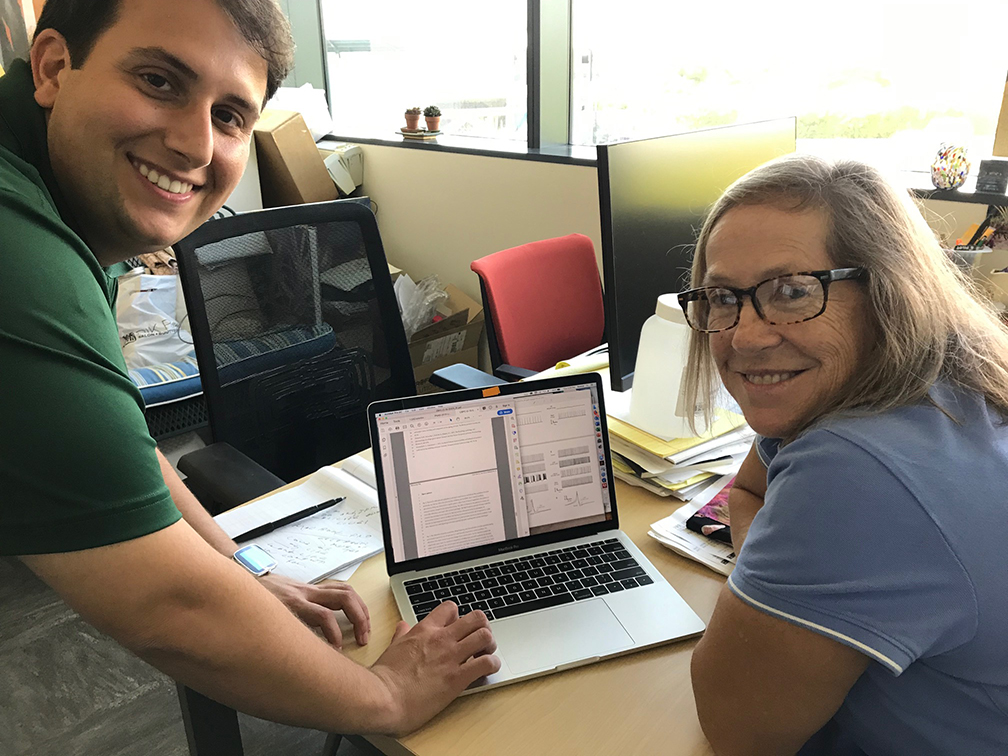Computer Lifecycle Management Program is the Answer for Aging Computers

When her computer, bogged down with Marine Biology & Ecology research programs and creaky with age, finally gave out, associate professor Lynne Fieber had little choice.
"It's time for a new machine," Fieber admitted to herself. "I'd heard rumors about the University's Computer Lifecycle Management Program (CLMP), but didn't know anyone who'd done it," she remembers.
She contacted tech support at the Rosenstiel School, and desktop technician Chris Gomez arrived in short order.
"I was shocked," Gomez laughed. "It was the oldest Mac mini I'd ever seen, woefully out of date, and suffering performance-wise."
Fieber is full of praise for Gomez's assistance. He guided her through every step of the CLMP process to replace her old computer with a new MacBook Pro, even advising her on extra features she needed.
Now Fieber whizzes through her work programs. "This is the new love of my life," she laughed.
Through the University's CLMP program, full-time faculty or staff based at the Coral Gables or Rosenstiel campuses are eligible to renew computers that are older than four years. General purpose labs are eligible to participate as well, though departments that generate their own revenues are not.
The program advances the University's commitment to administrative excellence outlined in the Roadmap to Our New Century, supporting operational efficiency and financial sustainability.
"The CLMP serves to ensure that employees and staff have technology that is up to date, which therefore decreases the likelihood of hardware failure—and that impacts productivity," said Anthony Ray Rodriguez, director IT Desktop Support.
For the same 2019 to 2018 January-August period, the number of desktop support incidents handled by the desktop support team dropped by 38 percent, 9,655 compared to 6,013.
Rodriguez emphasized that, while the CLMP was a strong contributing factor, it was not the sole reason for the big drop in incidents. "That owes to a combination of factors—Service Desk proactivity, streamlining of calls, security Windows patching, teamwork, and more—but the CLMP certainly plays a key role," he said.
The program saves the University money over time because computer warranties generally expire after three years, and it is costlier to repair aging or deficient computers than it is to replace them.
In FY2019 alone, more than 1,000 employees—the most ever—took advantage of the CLMP, now in its sixth year. "It shows that more people are aware of the program's benefit," Rodriguez said. To date in FY2020, 464 faculty and staff are already enjoying a new desktop or laptop.
Desktop Support technician Mike Cody manages the CLMP program under the supervision of Javier Garcia, 12 years in the department.
"We try to keep everyone happy while adhering to security and compliance and, of course, staying within our budget," Garcia said.
"We keep improving CLMP, constantly watching computer trends and figuring out what's the best fit for the employee or faculty," Cody said.
The Business Operations team also plays an integral role in facilitating the CLMP process, customizing the bundles that employees want and need, negotiating better prices, ensuring delivery and installation, and even helping to identify the best new models.
"It's truly a collaborative effort," said Amado Salazar, manager of IT Procurement. "Historically we've helped to identify the latest, great trends for the CLMP, and we will continue to do that together with Desktop Support."
Business Operations has also shifted from hard disk drives (HDDs) to more solid state drives (SSDs). SSDs have no moving parts as compared to the spinning disks of HDDs. Solid state drives are quieter, use less energy, are four times faster, and are much more reliable with a mean-time between failure of over 2 million hours. Fewer moving parts, fewer problems.
"People often don't think about the lost productivity when the machine goes down, that's work that's not getting done, and then there's the manpower that has to try and fix it," Salazar said. "One of the ways we've helped to standardize is to continue to put better products in peoples' hands. That lowers the cost of ownership, which costs the University less money overall."
Members of eligible departments can choose between Dell, Apple, and now Microsoft Surface, bundles at no cost to the department. If something other than what is offered is needed, there is also $1,000 allowance available for customized computer orders in lieu of choosing a bundle. (If a customized computer order is more expensive than the allowance, the department will be asked to cover any additional cost over $1,000.) Less expensive PCs may take advantage of increasing RAM, storage, processor, etc.
The CLMP will work with your data custodian to order, replace, and retire computers in the University system as part of its commitment to meet the technology needs of both today and the future.
For more information about CLMP, visit miami.edu/clmp.




